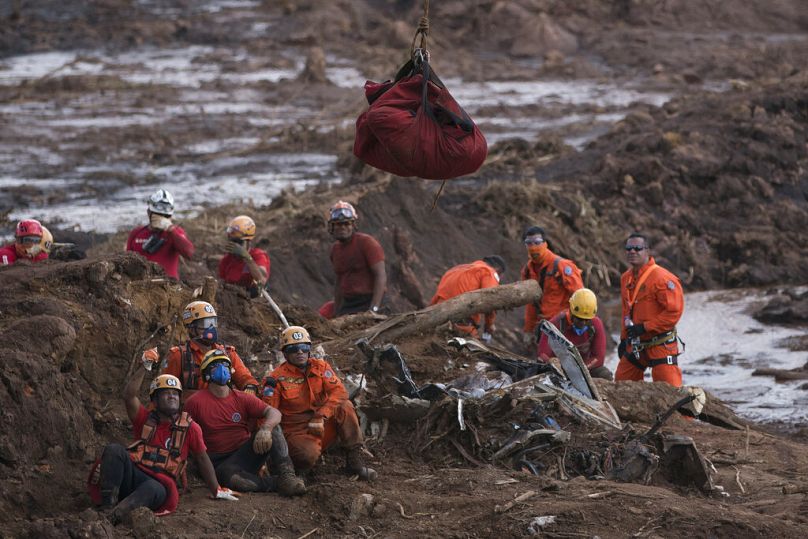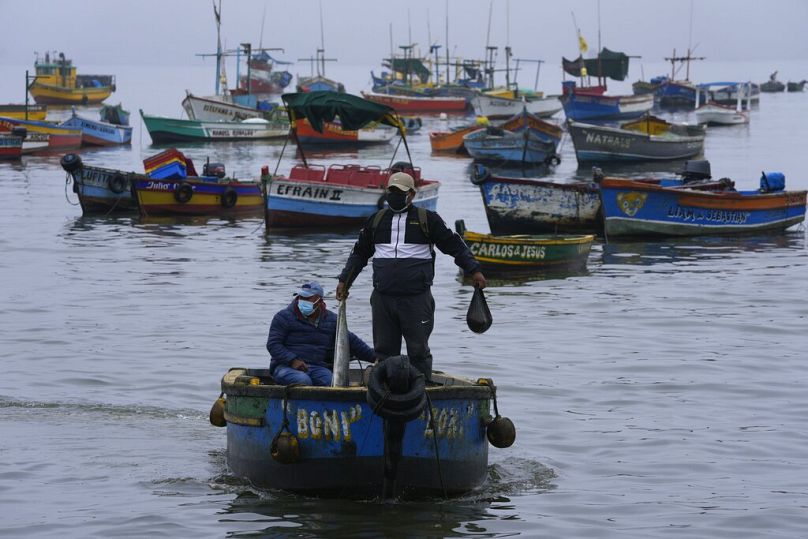Undermining binding EU legislation on corporate accountability would be a green-light signal by the bloc's governments to reckless businesses that they can keep fuelling the climate and ecological crises for corporate profits, Alban Grosdidier writes.
A law to defend human rights and the environment from corporate exploitation should never have been controversial in the first place.
 ADVERTISEMENT
ADVERTISEMENT
 ADVERTISEMENT
ADVERTISEMENT
European multinational supply chains already have a hefty death toll attached.
Fast fashion factories like Rana Plaza collapsing and killing over 1,000 garment workers inside. 270 people buried in the catastrophic dam collapse in Brumadinho. Children drinking oil in Nigeria due to Shell’s reckless pollution of the Delta. EU-sponsored "carbon bombs" with projected emissions that are 17 times higher than the EU’s own 2030 carbon budget limit.
And still, some EU member states dare to question whether a law to hold corporations to higher standards of accountability is fair.
Last Wednesday, EU member states stalled a vote on the Corporate Sustainability Due Diligence Directive (CSDDD), jeopardising years of negotiations.
The incoherent political mess behind the delay has the fingerprints all over it of business lobbyists who are not afraid to hijack the EU democratic agenda for their own greed.
Avarice over democracy
We have seen that corporations get the ear of policymakers up until the last moment and can easily derail years of careful consensus-building.
Is there a space for citizens and their direct representatives, the Members of the European Parliament (MEPs), to be a part of the European process?
The directive’s political trilogue phase of the legislation closed in December — which should have marked the end of significant changes to the text.
And yet, the last few months have seen France, Germany, and Italy, among other countries, make underhanded efforts to reduce the scope of the legislation or backtrack on their support altogether.
Given the horrifying scale of abuse and destruction at the hands of European supply chains and the EU’s purported leadership on human rights, justice and sustainability, we might have hoped that delays in the political process are at least due to concerns about how to best reinforce that reputation.
But no. France, Germany, Italy and others are not concerned that the law is already significantly watered down from previous versions. Of course not; they were the ones diluting obligations, installing sweeping exemptions.
They are instead, instrumental in spreading corporate-fed misinformation about the burden that the directive will have on major businesses.
Disinformation and political games
In Germany, minority partner Freie Demokratische Partei (FDP), currently polling at just 4% of popular support in Germany, has been spreading fake news about the dangers of the directive for businesses, suggesting that the directive will put a heavy burden on SMEs and unreasonable requirements on family businesses — something not even businesses themselves believe.
The German investigative journal Spiegel found that 71% of interviewed companies expect positive long-term financial impacts from the CSDDD.
Meanwhile, France, who previously championed the CSDDD, made a bizarre last-ditch effort on Wednesday to increase the employee threshold scope of the directive of the number of employees from 500 to 5,000, effectively exempting more than 80% of companies from accountability.
The baseless grievances of big business are getting a lot more airtime than those of the communities forcibly displaced from their homes for pipelines, than human rights defenders murdered for speaking out against illegal corporate land-grabbing, or the Peruvian fishermen families whose coastline has been swallowed by oil spills.
Where is the voice of the dead, the maimed and the enslaved in EU headlines?
It's not over yet
Lara Wolters, S&D MEP, called the attempts to undermine the text a “flagrant disregard for the European Parliament as co-legislator,” in her latest press conference.
This contempt for democracy threatens to turn the EU’s political process into a laughing stock.
Undermining binding EU legislation on corporate accountability would be a harrowing failure by EU governments to meet their obligations under international human rights law, and a green-light signal to reckless businesses that they can keep fuelling the climate and ecological crises for corporate profits.
But it’s not over yet. After two years of arduous negotiations, the EU didn’t get this far on a milestone human rights directive just to watch a few countries jeopardise it for cheap political gains.
The Belgian Presidency is committed to finding solutions to reach a majority, and the European Parliament has also shown its eagerness to pass the CSDDD before the EU elections.
All eyes are on the European Council now, and the member states which are part of it. This is not a game — this is the chance to stop the European supply chain death toll.
Alban Grosdidier is Corporate Accountability Campaigner at Friends of the Earth Europe.
At Euronews, we believe all views matter. Contact us at view@euronews.com to send pitches or submissions and be part of the conversation.












